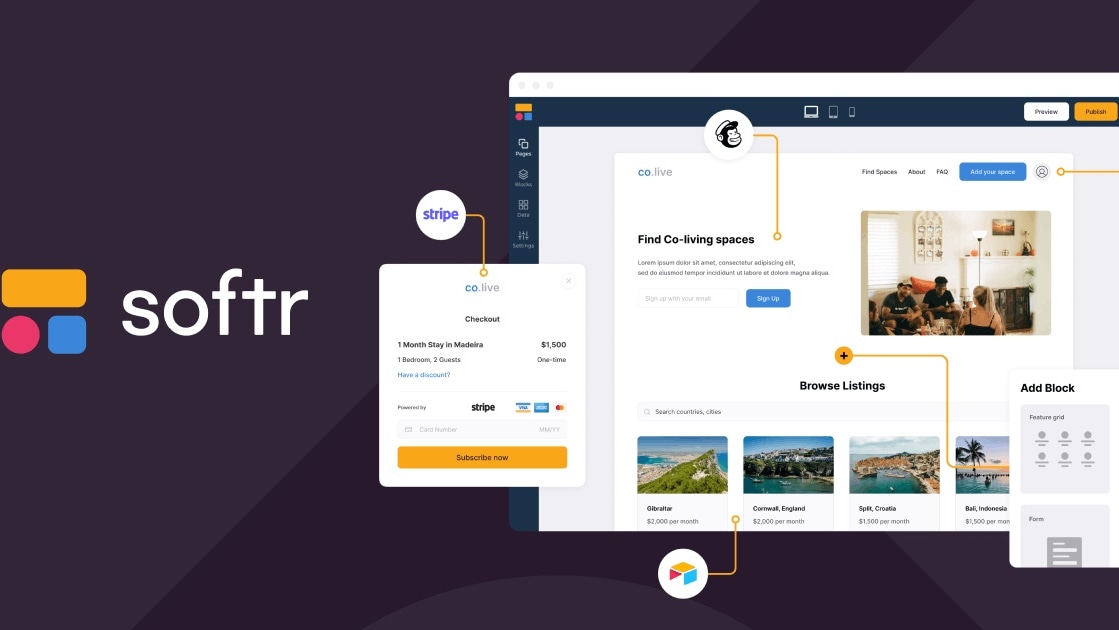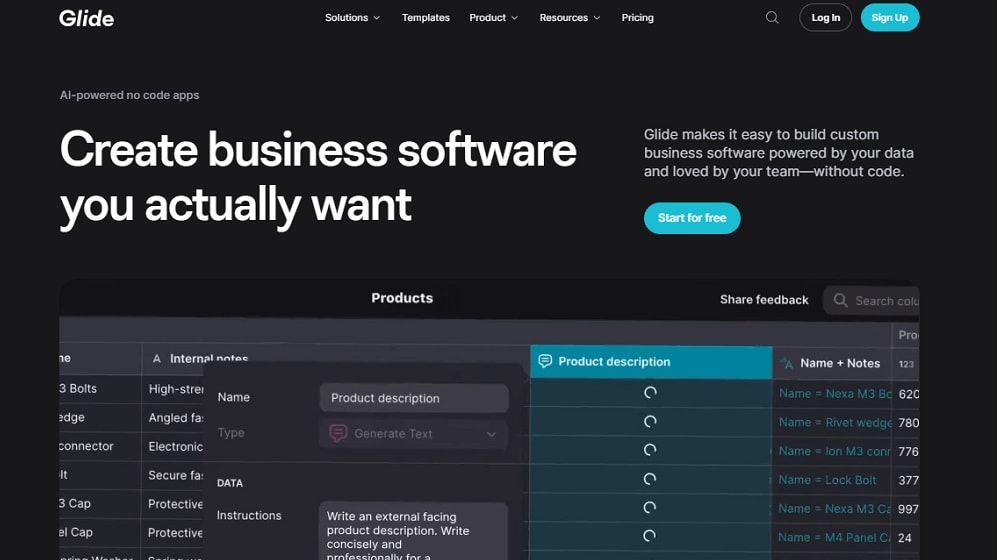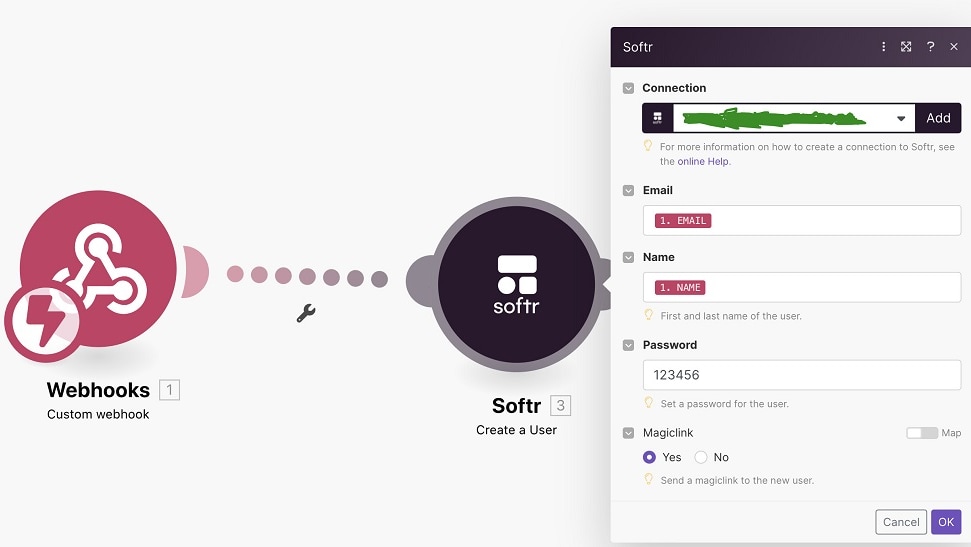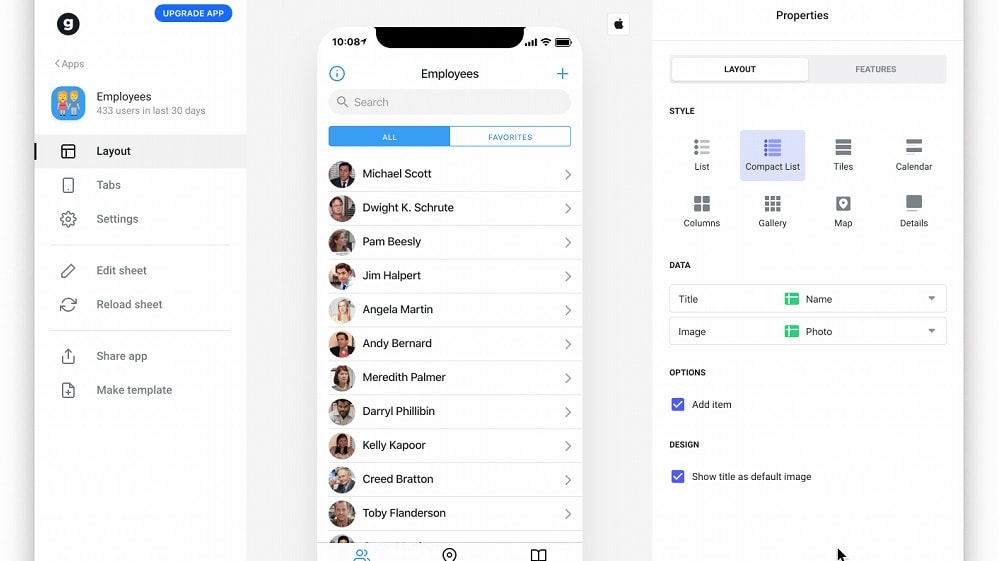Softr vs Glide: Selecting the ideal no-code app building platform for your needs
- 01Softr vs Glide: overview
- 02What's the difference between Softr and Glide?
- 03Softr pros and cons
- 04Glide pros and cons
- 05Softr compared to Glide
- 06Glide compared to Softr
- 07Features comparison
- 08Softr vs Glide: Which is the best for your business?
- 09Promotions on No-Code Development software
- 10Alternatives to Softr & Glide
Access up to $504 savings on Softr & $516 on Glide
Access up to $504 savings on Softr & $516 on Glide
Choosing the right no-code app building platform for your business can significantly impact your ability to create custom applications, streamline processes, and improve efficiency. These platforms empower individuals and businesses to transform ideas into functional apps without coding skills. However, with multiple options available, making the right choice can be a daunting task.
That's why we've put together this comprehensive comparison of two prominent no-code app building platforms—Softr vs Glide. In this detailed analysis, we'll explore their key features and highlight the main distinctions between these platforms. Our aim is to provide you with the essential information needed to make an informed decision about the best solution for your app development needs. Whether you're looking to create a web app, mobile app, or both, this comparison will help you navigate the Softr vs Glide landscape and select the ideal platform for your specific requirements.
Softr vs Glide: overview
Softr and Glide are two prominent contenders in the realm of no-code app building platforms, each tailored to distinct user requirements and app development approaches.
Softr is known for its user-friendly interface and efficient app creation capabilities without the need for coding skills. It excels in providing a platform that simplifies the process of turning ideas into functional web and mobile applications. Glide, on the other hand, is celebrated for its versatility and robust customization features. It is particularly well-suited for those who require intricate app development, database integration, and advanced functionality in their applications.
Now, let's delve into the Softr vs. Glide comparison to help you make a well-informed decision when selecting the right no-code app building platform for your specific app development needs. Whether you are looking to create a simple app or a complex one, this comparison will guide you in choosing the platform that aligns with your unique requirements.
What's the difference between Softr and Glide?


Softr promises a simple and powerful way of building apps and websites using the same simple interface. The main focus of Softr when it comes to pulling in data is from Airtable, which can sometimes be restrictive, but there is, of course, Google Sheets, which is more flexible. Unlike, Glide, Softr had numerous integrations from the start, offering options like Google Analytics all the way to Clarity. Despite all of this, the apps it creates are not as responsive as Glide’s, and to make things more difficult, there is a limited number of automation options. On the positive side, it does offer quality template options compared to Glide (but not a lot of them, since Glide has over 400), which can help you get started quickly.
Glide is a no-code app-building platform that can utilize your spreadsheets and databases to create apps. It can utilize data from sources like Google Sheets, Excel, Airtable or Glide Tables and help you create an app out of the data with just a few clicks. With Glide, you’re not only limited to web apps, you can create mobile apps for both Android and iOS. The creation process, per default, shows screens for each table, but you can customize each screen according to your needs. Furthermore, there is a strong community of experts behind Glide, which regularly contributes additional assets and resources. There are hundreds of templates to choose from, as well as pre-built components that help you get started on your design journey as fast as possible. If you’re looking for integrations, you can do so with Zapier, and a few other services.
Finally, the final choice between these two will, of course, be tied to your business needs, though Glide did make a compelling case for it to be the favorite for companies that are looking to get started fast, cheap, and get good results regardless of the template they choose, or number of customization.
Softr pros and cons
What are the advantages of Softr?
No-code development: Softr allows users to build web and mobile applications without coding, making it accessible to a wide range of individuals and businesses.
User-friendly interface: It offers an intuitive and user-friendly interface, making it easy for users to design and customize their apps.
Templates and pre-built blocks: Softr provides a variety of templates and pre-built blocks that speed up the app development process.
Database integration: Users can easily integrate data from sources like Airtable and Google Sheets, enhancing the functionality of their apps.
Responsive design: Softr apps are automatically responsive, ensuring they work well on different devices and screen sizes.
What are the disadvantages of Softr?
- Limited customization: While it offers customization options, advanced customization may be limited for users with highly specific requirements.
- Scalability: Some users may find limitations in scaling their apps for very complex or large-scale projects.
- Integration options: While it integrates with popular services, the range of available integrations may not be as extensive as some competitors.
- Learning curve: Although user-friendly, beginners may still face a learning curve when using Softr, especially for complex app projects.
- Support channels: While email support is available, some users may prefer additional support options such as live chat or phone support.
Compare Softr to other tools
Glide pros and cons
What are the advantages of Glide?
- No-code app building: Glide enables users to create web and mobile apps without coding, making it accessible to a broad audience.
- Data integration: It seamlessly integrates with Google Sheets, allowing users to leverage spreadsheet data for app content.
- Customization: Glide offers extensive customization options, empowering users to design and modify app layouts and features.
- Responsive design: Apps built with Glide are automatically responsive, ensuring they work well on various devices.
- Complex functionality: Glide supports complex functionality, making it suitable for a wide range of app types, from simple to advanced.
What are the disadvantages of Glide?
- Learning curve: Despite its capabilities, beginners may find Glide's interface and features overwhelming, requiring time to master.
- Limited integrations: Glide's integration options are primarily centered around Google Sheets, which may limit some users' flexibility.
- Pricing complexity: Users have reported some confusion regarding Glide's pricing tiers and cost structure.
- Advanced features: While Glide offers robust features, users with very specific or advanced app requirements may still encounter limitations.
- Support options: The availability of support options, such as live chat or phone support, may be limited compared to some competitors.
Compare Glide to other tools
Softr compared to Glide
Softr and Glide are two prominent no-code app building platforms, each with distinct strengths. Softr is prized for its user-friendly interface and rapid app development, making it ideal for those seeking quick and straightforward solutions. It offers templates and integrates seamlessly with data sources like Airtable and Google Sheets.
Glide, on the other hand, stands out for its robust customization options and ability to handle complex app functionality. While Glide integrates with Google Sheets and offers extensive customization, it may have a steeper learning curve. The choice between Softr and Glide depends on your specific app development needs, simplicity, or intricate customization requirements.
Is Softr better than Glide?
Determining whether Softr is better than Glide depends on your specific needs. Softr excels in user-friendliness and rapid app development, making it a great choice for those seeking quick and straightforward solutions. It offers templates and integrates seamlessly with data sources like Airtable and Google Sheets. Glide, on the other hand, is known for robust customization and the ability to handle complex app functionality. However, it may have a steeper learning curve.
Your decision should align with your project's requirements, whether it demands simplicity and speed (Softr) or intricate customization and advanced features (Glide).
What is Softr best used for?
Softr is best used for rapidly creating web and mobile applications without coding. It is particularly well-suited for individuals and businesses looking to streamline processes, build custom tools, or prototype ideas efficiently.
Softr shines in scenarios where user-friendliness and speed are paramount, making it an excellent choice for entrepreneurs, startups, and small to medium-sized enterprises. Users can leverage its templates and data integration capabilities to create solutions such as CRM systems, dashboards, e-commerce platforms, and more. Softr empowers non-technical users to transform concepts into functional applications, making it a versatile tool for a wide range of app development projects.
Can Softr replace Glide?
Whether Softr can replace Glide depends on your specific needs and the complexity of your app project. Softr excels in providing a user-friendly, no-code platform for quick app development, making it suitable for simpler applications and projects where speed is essential.
However, Glide offers more extensive customization options and supports complex functionality, making it a better choice for advanced app requirements. If your project demands intricate customization and advanced features, Glide may be the preferred option. Evaluate the specific needs of your app development project to determine whether Softr can replace Glide effectively or if a different tool is more suitable.
Is Softr cheaper than Glide?
Softr and Glide serve different purposes, making a direct cost comparison challenging. Softr is a no-code app building platform, while Glide is a project management and issue tracking tool. Softr's pricing typically depends on factors like usage and features required for app development.
Glide's pricing, on the other hand, is based on the number of users and the deployment option (cloud or self-hosted). Generally, Softr may have a lower cost of entry for small-scale app development projects, but for project management needs, Glide's pricing can vary widely. To determine which is cheaper for your specific use case, assess your project requirements and the associated costs of each tool.
Is there a better No-Code Development software than Softr?
Identifying a better software than Softr hinges on your specific no-code app development requirements. Several alternatives cater to various needs and preferences.
Alternatives to Softr include Glide, Adalo, Bubble, and OutSystems, each with its own set of features and capabilities. For instance, Glide offers extensive customization options, while Bubble is known for its versatility in building complex apps. Your choice depends on factors like project complexity, desired functionality, and your familiarity with no-code platforms.
50% off the Professional plan for 6 months on Softr
Get 50% off the Professional plan for 6 months on Softr and up to $504 savings with Secret.
Glide compared to Softr
Glide and Softr are prominent no-code app development platforms, each with distinct strengths. Glide stands out for its robust customization options, enabling users to create complex, feature-rich apps. It excels in handling intricate functionality and database integration, making it suitable for diverse projects. However, its learning curve might be steeper for beginners.
In contrast, Softr prioritizes user-friendliness and rapid app creation, making it ideal for those seeking simplicity and speed. It offers templates and integrates seamlessly with data sources like Airtable and Google Sheets. The choice between Glide and Softr ultimately depends on the complexity of your app project and your familiarity with no-code development.
Is Glide better than Softr?
Determining whether Glide is better than Softr depends on your specific app development needs. Glide excels in providing extensive customization options and handling complex app functionality, making it a strong choice for advanced projects. However, its learning curve may be steep for beginners.
Softr, on the other hand, prioritizes user-friendliness and quick app development, making it ideal for simpler projects where ease and speed are key. The choice between Glide and Softr hinges on the complexity of your app project and your comfort level with no-code development.
What is Glide best used for?
Glide is best used for creating web and mobile applications without coding, particularly for projects requiring extensive customization and complex functionality. It excels in scenarios where users need to harness data from Google Sheets and integrate it into their apps, making it suitable for a wide range of data-driven applications.
Glide is an excellent choice for those looking to build sophisticated and interactive apps, such as database-driven tools, project management dashboards, inventory management systems, and more. Its versatility and ability to handle intricate functionality make it a powerful tool for users with advanced app development needs who want to avoid traditional coding.
Can Glide replace Softr?
Whether Glide can replace Softr depends on your specific no-code app development requirements. Glide is known for its extensive customization capabilities and is well-suited for complex, data-driven applications. However, it may have a steeper learning curve, making it less ideal for those seeking quick and straightforward app development.
Softr, on the other hand, prioritizes user-friendliness and rapid app creation, making it a strong choice for simpler projects where ease and speed are paramount. To determine if Glide can replace Softr effectively, assess the complexity of your app project and your comfort level with no-code development tools, as well as your specific functionality and customization needs.
Is Glide cheaper than Softr?
Determining whether Glide is cheaper than Softr depends on your specific needs and the scale of your app development project. Glide and Softr have different pricing structures. Softr offers various pricing tiers, including a free plan, with costs potentially increasing with usage and additional features. Glide’s pricing, on the other hand, offers a free plan with limitations and a paid plan with more advanced features.
The relative cost-effectiveness of Glide or Softr will depend on the specific requirements of your app project and which features you need. To make an informed decision, assess your budget and the features essential for your app development goals.
Is there a better AI Development software than Glide?
Determining whether there's a better software than Glide depends on your specific no-code app development needs. Numerous alternatives cater to diverse requirements in the no-code space.
Alternatives to Glide include Softr, Adalo, Bubble, and OutSystems, each with its own unique features and strengths. For instance, Softr is known for its user-friendliness and rapid app development, while Bubble offers extensive customization options. The choice of the best software largely relies on your individual project complexity, functionality requirements, and your familiarity with no-code platforms.
50% off the Maker plans for 1 year on Glide
Get 50% off the Maker plans for 1 year on Glide and up to $516 savings with Secret.
Features comparison
Softr Excels Ahead of Glide for User-Friendliness

In the realm of user-friendliness, Softr takes the lead with its remarkable ease of use. Its drag-and-drop interface simplifies web application and landing page creation, catering even to those with no coding experience. The real-time preview feature ensures that changes are immediately visible, enhancing the development process. Softr's philosophy revolves around empowering non-technical users to craft impressive and functional web apps effortlessly.
On the other hand, Glide also offers a user-friendly approach with drag-and-drop functionality. However, it leans more towards users with a modest level of technical knowledge. Glide's integration with Google Sheets as its foundation requires users to grasp basic spreadsheet management concepts. This subtle distinction highlights the need for some technical familiarity when navigating Glide's capabilities, contrasting with Softr's more accessible design.
Softr Excels in Secure Payment Integration over Glide

When it comes to accepting secure payments through the application, Softr emerges as the frontrunner. Softr boasts a built-in payment integration system that not only streamlines the payment collection process but also handles security and compliance matters adeptly. This comprehensive approach ensures that businesses using Softr can accept payments for their products or services seamlessly while adhering to stringent security standards and compliance regulations.
In contrast, Glide's documentation does not prominently mention similar advanced payment features, leaving some uncertainty regarding its capabilities in this area. Softr's robust payment integration provides a clear advantage for businesses seeking a secure and hassle-free payment processing solution, underscoring its proficiency in this crucial aspect of app development.
Softr Leads in Integration Diversity Over Glide

In the realm of integration capabilities, Softr displays notable prowess, positioning itself as a strong contender. Softr's advantage in this department is particularly evident in its ability to seamlessly integrate with various data sources, such as Airtable and Google Sheets. This feature empowers users to harness data-driven functionalities within their applications, facilitating dynamic content management and data utilization.
For instance, imagine building a project management app that effortlessly syncs with your Google Sheets data, ensuring real-time updates and efficient project tracking. Softr's robust integration capabilities enable precisely this kind of synergy between your app and external data sources.
While Glide also offers integration capabilities, Softr's versatility and ease of data integration stand out. Businesses looking to leverage the power of integrated data in their applications may find Softr's capabilities more aligned with their needs, enhancing the overall functionality and value of their apps.
Glide Outperforms Softr in Real-Time Collaboration

While both Softr and Glide showcase integration capabilities, Glide takes a distinctive lead in the realm of real-time collaboration during app development. Softr offers Intercom integration, facilitating real-time communication with users, which is undoubtedly valuable. However, Glide goes a step further by enabling real-time collaboration among team members directly within the app development process itself.
This game-changing feature allows multiple team members to work collaboratively on the app simultaneously, with changes visible in real-time to all involved. This aspect positions Glide as the preferred platform for projects that require seamless teamwork and simultaneous contributions. Whether it's fine-tuning app features or brainstorming ideas, Glide's real-time collaboration capabilities foster an environment of efficient and dynamic teamwork, setting it apart from Softr.
Softr Excels at Data Leveraging Compared to Glide

While both Softr and Glide offer impressive data integration features, Softr distinguishes itself with a robust methodology. Softr's approach to data integration is a standout feature that can significantly benefit businesses. It excels in harnessing the power of your business data from sources like Airtable or Google Sheets, offering a level of optimization that sets it apart from Glide.
With Softr, you have the capability to create applications finely tuned for data utilization and performance. This means that your business operations can benefit from seamless data flow, resulting in improved efficiency and productivity. While Glide also offers data integration capabilities, Softr's method stands out as a powerful tool for businesses looking to maximize the potential of their data within their applications.
Softr and Glide are Equally Robust in Form Creation

In the domain of custom form creation, both Softr and Glide offer user-friendly solutions tailored to meet various needs. Whether you're crafting contact forms, surveys, or any other custom form, both platforms provide accessible tools for the task.
Softr boasts an intuitive drag-and-drop interface, ensuring that users can effortlessly design and deploy forms tailored to their requirements. Similarly, Glide also excels in simplifying custom form creation with its interactive components and user-friendly approach.
For instance, users can effortlessly design contact forms, surveys, or feedback forms, benefiting from the convenience of drag-and-drop functionality. While both Softr and Glide excel in this aspect, the choice between the two may ultimately hinge on other project-specific factors, such as data integration or collaboration requirements. Nonetheless, users can rely on the ease of form creation with either platform to enhance their app's functionality.
Glide Offers Faster App Deployment than Softr

In terms of deploying your app, Glide takes the lead with its expedited process. Traditional app deployment methods often involve prolonged waiting periods for app store approvals, causing delays in reaching your audience. In contrast, Glide empowers you to instantly deploy your app, eliminating the hassles associated with the approval waiting game.
Softr, while adept at removing technical obstacles in the app development journey, does not explicitly specify a feature for instant deployment. This distinction grants Glide a notable edge, particularly for those seeking swift app launches and immediate user access. Glide's rapid deployment capability streamlines the transition from app creation to user interaction, enhancing its appeal for businesses aiming for agility and speed in the app development process.
Subscribe to our newsletters.
No FOMO here. Stay up-to-date on all the latest deals and news with our monthly newsletter straight to your inbox like 113,000+ entrepreneurs (+ Get 10% off on on our Premium Membership!)
Softr vs Glide: Which is the best for your business?
Softr is the best tool for you if:
- You want to create web and mobile applications without coding skills, making it ideal for non-technical users.
- Quick and user-friendly app development is a priority.
- You appreciate templates and seamless data integration with Airtable and Google Sheets.
- Simplicity and ease of use are crucial for your project.
- You're looking to rapidly prototype or build functional apps for small to medium-sized projects.
Glide is the best tool for you if:
- You need extensive customization options and advanced features for complex app development projects.
- Collaboration is a key requirement, with real-time teamwork during app development.
- You want to leverage Google Sheets as a foundation for app data management.
- Your project demands database integration and interactive, data-driven app functionality.
- You are comfortable with a slightly steeper learning curve in exchange for powerful customization capabilities.
Alternatives to Softr & Glide
Promotions on No-Code Development software
Start saving on the best SaaS with Secret.
Secret has already helped tens of thousands of startups save millions on the best SaaS like Softr, Glide & many more. Join Secret now to buy software the smart way.
















